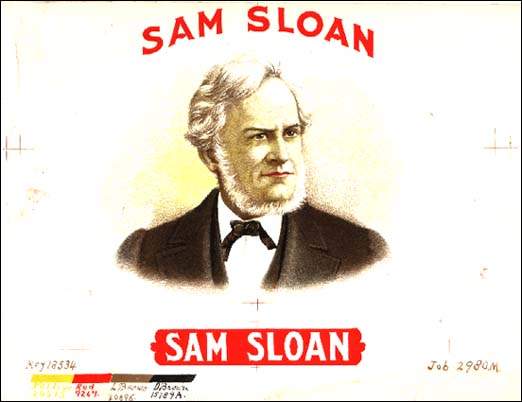
There are two famous persons named Sam Sloan. The first was an architect. He wrote a book in 1852 which is still in print under the name "Sloan's Victorian Houses". This book was a best seller when it first came out. It essentially contained the blueprints and designs which were used in the construction of almost every house during that era.
 |
There was another, richer Samuel Sloan who was President of the Delaware, Lackawanna, & Western Railroad. Gustavus Myers, in his classic work, "History of the Great American Fortunes", describes that Samuel Sloan as one of "the monarchs of the land ... the actual rulers of the United States; the men who had the power in the final say of ordering what should be done."
That Samuel Sloan was an ally of J. P. Morgan. Samuel Sloan was one of the founders of what is now Citibank and his name is engraved in stone on the wall in the former Citibank headquarters at 55 Wall Street. There is also a statute of that Samuel Sloan one block from Journal Square in Hoboken, New Jersey.
Here are two quotes from what the History of the Great American Fortunes has to say about that Sam Sloan.
"BOTH SIDES CHARGES WITH FRAUD
"In less than a month after this, separate elections were held; each side again claimed that its directors were elected. More suits followed. Gould and Fisk charged that Ramsey, president of the road, had illegally issued three thousand shares of stock to the Morgan party, and demanded that this issue be invalid. Morgan, Samuel Sloan and others of the opposition retaliated with charges that Gould and Fisk had used force and fraud. The State of New York now stepped in, and through the attorney general, brought an action against both parties. The state charged that both stockholders elections' were illegal, irregular and void; that spurious votes had been counted in, and that otherwise they were full of fraud. (Lansing's Reports, New York Supreme Court, 1:308, etc. The statement of the case in the decision frequently refers to "the party headed by J. Pierpont Morgan.") The state asked for an injunction restraining both boards from taking possession.
"The case came up again in November, 1869, before Judge Darwin Smith in the Supreme Court at Rochester, N. Y. Gould and Fisk found themselves at great disadvantage. In New York City, with their bought judges on hand, they could arrange for decisions in advance, but in Rochester they were in territory where the power of competitive magnates was strongly entrenched. Judge Smith's decision was wholly favorable to the group of capitalists led by J. Pierpont Morgan, and the Albany & Susquehanna railroad passed into their control. (See, The People of the State of New York vs. The Albany and Susquehanna Railroad Company, Lansing's Reports, N. Y. Supreme Court, 1:308-345.)"
("History of the Great American Fortunes", by Gustavus Myers, 1909, first Modern Library edition, 1936, pages 555-556.)
[Skip to page 572]
"MORGAN DIRECTS MATTERS
"These facts will give a fairly clear idea of the composition and pretensions of those middle groups which the news of the meeting in Morgan's house was bound to excite into convulsions. A momentous gathering it was that assembled in Morgan's mansion on January 8, 1889. Who were they we note there? Apparently private citizens; in reality monarchs of the land: Jay Gould with his son George, held by the leading strings; Stickney, of the Northwest Territory; Roberts, of the Pennsylvania Railroad; sleek Depew, echoing the Vanderbilts; Sloan, of the Delaware, Lackawanna, & Western Railroad, and a half dozen more magnates or their accredited mouthpieces. The honorable legislatures could gravely discuss the advisability of this or that legislation; the noisy "Congress of the United States" could solemnly meet and after wearing out mouths in rodomontade, profess to make laws; the high and mighty Courts could blink austerely and pompously hand down their decisions. But in that room in Morgan's house sat many of the actual rulers of the United States; the men who had the power in the final say of ordering what should be done."
("History of the Great American Fortunes", by Gustavus Myers, 1909, first Modern Library edition, 1936, page 572.)
Cited above is a lengthy court decision which can be found in any law library in Lansing's Reports, which described how Sam Sloan and his ally, J. P. Morgan, succeeded in ousting notorious robber-barons Gould and Fisk from control of the Albany & Susquehanna Railroad. These events bear at least passing mention in every American History book.
That Samuel Sloan is also described in the classic work "Reminesecnces of a Stock Operator" by Edwin Lefevre, who said: "The newspapers never had to beat around the bush with Old Sam Sloan."
Sam Sloan
Here are links: